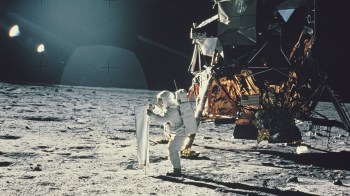Creating the next Silicon Valley in Chicago
Chicago is just a couple hours’ drive from one of the best schools in the country for computer science and engineering — the University of Illinois at Urbana-Champaign. But its students are often drawn to other shores.
“I guess in the past few years Chicago hasn’t really been on the map in terms of the tech industry,” says Brianna Birman, a senior computer science major.
“So far it looks like a lot of jobs are in the Silicon Valley, Calif., area,” says sophomore Nathan Handler.
Earlier this month the mayor of Chicago, Rahm Emanuel, made a pilgrimage of sorts down to Urbana to change their minds. He brought with him executives from 39 technology companies, including local success stories like Groupon and GrubHub.
I sat down with Emanuel in his office after the trip. “This is a state university that the Chicago taxpayers help finance,” Emanuel says. “I don’t want to have helped finance their education, and then they leave for the coasts.”
Chicago is haunted by the big ideas that got away. Marc Andreeson — the co-founder of Netscape and one of the biggest venture capitalists in the world — was a University of Illinois grad. Founders of Youtube, Paypal and Yelp also studied there before heading west.
“Talent is what draws companies,” says Mayor Emanuel. “I want to draw the talent here, and the companies will follow.”
Innovation Nation. Click through to see how your state ranks in terms of high-tech jobs and wages. Explore the interactive map.
So how does a city draw talent? For starters, it needs a place for them to stretch out and try new ideas. Like Chicago’s legendary Merchandise Mart, a massive building of showrooms and shops that’s becoming a new technology hub. Motorola Mobility — just bought by Google — is moving in with 3,000 employees.
“The Merchandise Mart is the second-largest building in the country by square footage,” says Kevin Willer, CEO of the Chicagoland Entrepreneurial Center. “Number one is the Pentagon. You can look it up on Wikipedia.”
In May Willer’s nonprofit group launched a new startup space in the Mart called 1871. The name is a nod to the period of innovation after the Great Chicago Fire. It’s got all the standard tech accessories — high-end coffee shop, arcade games. Workers whiz by on scooters. There are workshops and meetings with mentors. One hundred startups now share office space.
“The hope is that they move in, plug into all kinds of resources and connections, and then move out,” Willer says. “That’s success — well hopefully — if they’re leaving because they’re going to get their own office.”
So far, one company called Food Genius has made that move, after raising a round of capital. Chicago’s getting more of that, too. Just an El stop away from the Merchandise Mart is Lightbank, a venture capital firm run by the co-founders of Groupon.
In its offices in Chicago’s River North, exercise balls stand in for desk chairs. Balloons and purple streamers hang from the ceiling — remnants of a birthday celebration. Co-founder Brad Keywell made a fortune taking companies like Groupon and Echo Global Logistics public.
“We’ve invested in I think 53 companies right now, after only 18 months,” he says. “That is the most critical thing for a great technologist to find when they are considering their careers.”
But engineering a great startup culture takes more than money and talent. Margaret O’Mara teaches history at the University of Washington and writes about the global quest the create the next Silicon Valley. “One of the things that the Valley has that’s really, really distinctive, is this extraordinary tolerance of risk and failure,” she says. “That kind of culture you don’t see in a place like Chicago. Chicago is more conservative.”
O’Mara says Chicago will also need enough successes to convince budding entrepreneurs and investors that betting on the city is worth the risk.
There’s a lot happening in the world. Through it all, Marketplace is here for you.
You rely on Marketplace to break down the world’s events and tell you how it affects you in a fact-based, approachable way. We rely on your financial support to keep making that possible.
Your donation today powers the independent journalism that you rely on. For just $5/month, you can help sustain Marketplace so we can keep reporting on the things that matter to you.



















